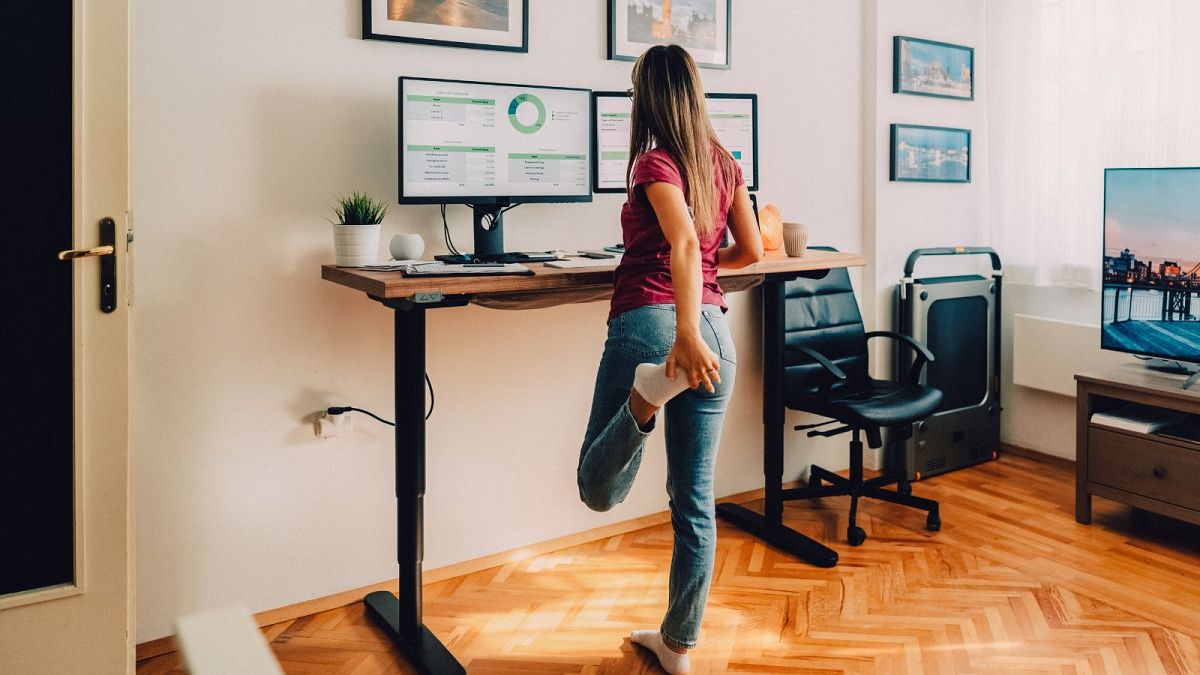
Experts weigh in on whether a standing desk is actually helpful in counteracting a sedentary lifestyle or not. Standing desks have been sold as a potential alternative for office workers to curb the adverse effects of prolonged sitting but how well do they really work? Some claim standing desks can help with weight loss, lowering blood sugar levels, or even improving back pain. Yet the science isn’t as clear-cut as the marketing is.
Standing seems to have some perks over sitting, said Kévin Desbrosses, a researcher at the French National Research and Safety Institute for the Prevention of Occupational Accidents and Diseases (INRS). "Sedentary behaviour has a clear definition: it’s any sitting or lying position, while awake, prolonged in time with a very low energy expenditure," he told Euronews Health and standing does not count. “For humans, sitting is a resting position while standing is a position where they’re on alert,” he said, adding that while standing, people expend more energy and have better blood flow “as long as the posture isn’t prolonged too long”.

Matthew Ahmadi, a research fellow from the University of Sydney in Australia recently looking into the impact of standing, sitting and stationary behaviour on cardiovascular health. “Overall, what we found was standing was better than sitting. Although standing was not associated with a higher risk of heart disease, it was also not associated with a lower risk of heart disease,” he told Euronews Health.
“We found prolonged periods of standing were associated with higher risk of circulatory conditions such as varicose veins and deep vein thrombosis, due to prolonged time spent in a static posture causing blood pooling in the lower extremities,” he added. Meanwhile, a in Finland published this month also showed that prolonged time standing at work was associated with higher blood pressure. Experts agree that the most important action people can take to counterbalance the effects of prolonged sitting is introducing movement into their routine.
"What’s important isn’t just the total daily amount of time spent [being] sedentary, it’s also the duration of each period spent in a sitting posture," Desbrosses said, with the longer people sit being worse for their health. He advocates for a change in posture every 30 minutes, for example by using an adjustable-height desk. Could that impact productivity? Desbrosses pointed out that showed no negative effects on productivity or performance while standing.
Research has established that a sedentary lifestyle - sitting for several hours - can adversely impact health and can increase your risk of diabetes, cardiovascular disease, several cancers, and depression among other conditions. "We know very well that sitting for too long will have an impact on our endothelial function, which is the capacity of the arteries to dilate or not depending on needs. If we sit too long, our body will be less able to achieve this modulation," said Alicia Fillon, from the French National Observatory on Physical Activity and Sedentariness, mentioning one of the several negative physiological effects.
In addition, prolonged sitting can also lead to oxidative stress which in turn "leads to inflammation," she said. Sitting could lead to weakened muscles and impact sugar regulation or blood pressure, "Movement will also have an impact on blood sugar levels because muscular contraction plays the same role as insulin, regulating glycemia," she added. Fillon also noted that prolonged sitting could also have an impact on cognition, and in particular will increase the risk of dementia in the long term, with some research showing this to be the case even for people who exercise.
.














